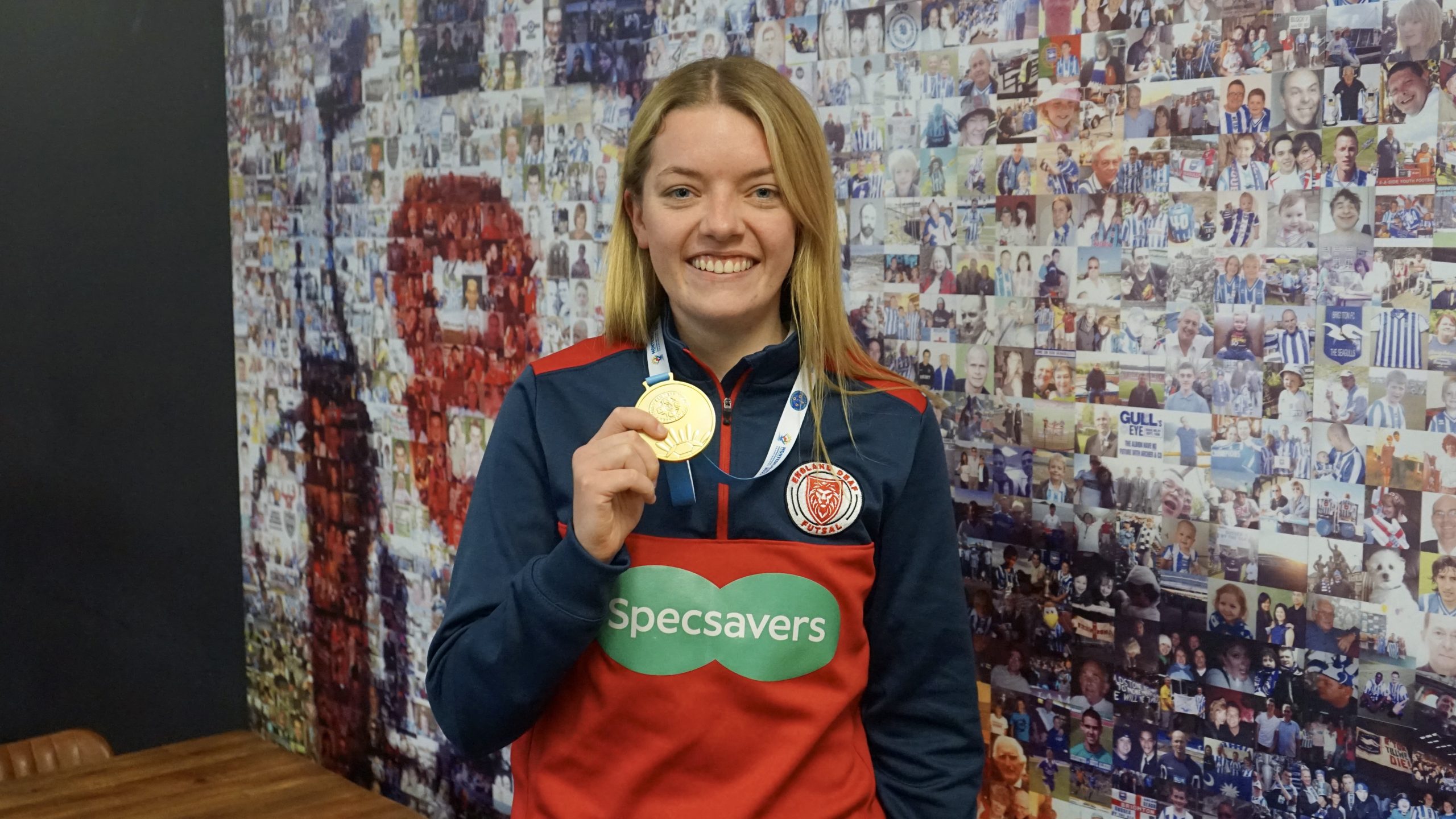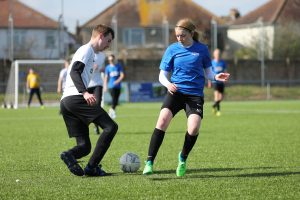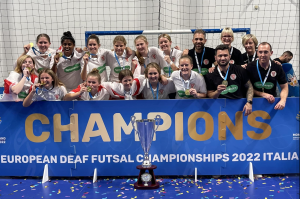Faye’s journey from life at AITC to glory as a Lioness

Faye Williams is one of many success stories in our disability football programme.
After first joining our inclusive sessions at the age of 12, Faye has gone on to make history with the England Deaf Futsal team.
She was part of the squad who won the European Deaf Futsal Championships in Italy last October – the culmination of a decade of hard work and dedication to make it to the top of deaf football.
Faye’s journey began when she was first asked to join our Disability Talent Hub about 10 years ago.
“I first got involved with AITC after I played in a disability schools tournament with my school when I was 12,” Faye told us.
“At the tournament I got scouted by an AITC coach, and he invited me along to play at their disability football sessions.
“I got invited to the AITC Disability Talent Hub where I started playing every week. I started off by playing with the men’s hearing impairment team. It was quite scary at first!”
Playing with older boys was challenging for a young Faye, but she thinks it helped mould her into a better player.
“There was a big size difference because I was 12 and they were all about 16,” she said, “It was quite intense but it helped to make me the player I am today.”
Faye was involved with AITC both on and off the pitch; she also spent two years completing our post-16 Football and Education course.
Sarah McAdam, Further Education Manager at AITC, was incredibly impressed by Faye during her time with us.
“Faye is an incredibly resilient and committed individual who impressed everyone with her determination to overcome barriers in order to succeed,” Sarah said.
Faye quickly showed massive promise and was fast-tracked through the system, going on to play at the AITC Regional Talent Centre before being invited onto the FA’s National Emerging Talent Programme.

When Faye turned 18 she was called up to the senior England Deaf Women’s squad.
“I was very proud when I was invited, it was a big moment,” Faye told us.
Sadly Faye’s journey came to a standstill in 2020 when the COVID-19 pandemic hit, preventing her from joining up with the squad.
Once football resumed after the pandemic, Faye managed to earn a spot in the Women’s Deaf Futsal squad ahead of the European Championships in Italy.
Disaster was to strike once again; just months before the tournament the FA decided to cease their funding for the deaf futsal programme, claiming they made the decision to refocus funding to “help develop the national 11-a-side format.”
“We first had training camps in preparation for the Euros, but the funding for deaf futsal was dropped before the tournament,” Faye said.
“We had to kind of make our own way and started England Deaf Futsal and enrolled ourselves into the Euros.”
After working hard to find a sponsor and raise funds, the team managed to raise more than £15,000 needed to take them to Italy; an experience which will stay with Faye as long as she lives.
“We went in with a really young squad; we had a 14-year-old, a 15-year-old, a 17-year-old, coming up against teams full of grown adults.
“All the other teams were very experienced and kind of looking down at us, so we definitely felt the pressure at the start.
Faye got on the scoresheet against Poland in the group stages, a moment she describes as “a dream”.
The England side finished second in the group stages and qualified for the knockout rounds, where they came up against host nation Italy in a tough test.
“Against Italy there were drums constantly going! That was probably the hardest match because, with being deaf you can’t communicate with anyone so it’s all done through body language, but when you feel the drums hitting the floor it’s so distracting.”
Faye and the team dispatched Italy, before being drawn against fierce rivals Germany.
England lost against Germany in the semi-finals a few years prior; England had been 5-0 up at half time only to lose the game 6-5. As a result, tensions were high and revenge was on the cards going into this chance to make amends.
“All the girls were upset from that previous game and definitely wanted some revenge! We beat them 6-1 this time around, so that was a really good feeling,” Faye said.
That result booked their spot in the final against Spain, which England ended up winning comfortably 3-0 to take home the trophy.
“It still feels like a dream. Getting caps for your country, getting games under your belt and more experience, and also playing with team-mates that are way more experienced than you, it’s all a dream.
The team are preparing for the world championships in Brazil next year, and hoping to receive the funding they need to participate.

Every aspiring footballer has to overcome hurdles on their way to the top, but female players in disability football face more barriers than most.
Faye has often had to play in mainstream football because of a lack of disability football availability for women.
“As a woman you often have to play in mainstream football, whereas there are quite a few deaf men’s leagues,” Faye told us.
“In mainstream football it can be a little difficult fitting in with the team, sometimes you’re left on the bench and don’t quite fit in, so it can be difficult.”
As a result Faye was full of praise for her time with AITC; she’s much more comfortable playing in disability football among people who can relate to her.
“It’s a lot more comfortable being able to play disability football, you feel more accepted as well, people are more understanding,” she said.
What does the future hold for Faye? A long career at the top, she hopes.
“I think my future is exciting. I’ve heard good feedback from coaches, some are even saying I could be ‘the future of England’, which is obviously nice to hear.
“When I was in primary school we were visited by an Olympic gymnast, and since then I’ve always wanted to become an Olympian one day.
“Hopefully I can help inspire younger players coming through, like older players inspired me in the past. Just to wear the badge is an honour.
Find out more about our work in disability football: https://bhafcfoundation.org.uk/football-participation/disability-football/

